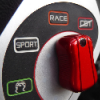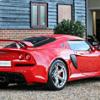quite different , the front rack is forward of the upright , etc.

Bootdog's (Uprated) Toelink Failure
#81

Posted 21 July 2014 - 09:22 AM
#82

Posted 24 July 2014 - 06:25 AM
Uprated bolts now on from Spitfire. They recommended using 8.8 for the inner and 10.9 for the outer. One bonus was the new inner bolts were longer than my previous ones so have now been able to fit additional locknuts to all of the bolts.
Martin S
#83

Posted 24 July 2014 - 07:43 AM
On mine, I reckon the looseness was due to the bolt starting to give way (i.e. the bolt was stretching), this would still happen if there were locknuts on.
#84

Posted 24 July 2014 - 03:17 PM
Interesting about the locknuts.
Hers why spitfire suggest the two types of bolts -
Two reasons for the two types of bolts -
First, the inner also clamps several parts of the subframe and bus together, these parts were designed to take an 8.8 at 45nm not a 10.9 at 65-70nm, you can already see the imprint of the bush into the subframe panel at 45nm so not really a good idea to increase further.
Secondly, it is completely pointless, assuming the double shear rear bracket/or brace has been made correctly and fitted correctly the bolt is already well supported.
The outer only clamps the bearing collets to the upright, nothing to bend so the higher bolt can be used without secondary issues.
#85

Posted 06 August 2014 - 07:47 AM
Hate to spoil some witch hunting here but.. the fasteners we're using are ordered by:
- DIN or ISO standard
- Size
- Tensile Strength
- Plating
They come from one of the largest industrial fasteners suppliers in Holland and are made by a German company.
Every single box comes with batch numbers and of course it's specification, so there's full traceability.
Just for the sake of it.. there's no such thing as a DIN912 ++ or 8.8 enhanced standard or whatever. If something is sold by a standard it's supposed to be made by a standard.
I am not saying it's impossible to have a duff bolt as there is no such thing as a 100% QC but it's highly unikely to see structural failures on these bolts. In fact, if this would be the case, the German manufacturer would have a serious issue as they supply them according to a standard to the automotive and industrial market.
When you abuse a bolt head by not inserting tools properly you can't expect the head to survive.
Explaining such use as kind of a test is bang out of order. A product has been designed for specific forces, both while tightening and while it's clamped. When you tighten a bolt with a tool in an angle aka not properly inserted you will break any head.
Edited by YvoTuk, 06 August 2014 - 07:55 AM.
#86

Posted 06 August 2014 - 08:02 AM
#87

Posted 06 August 2014 - 10:41 AM
I fitted the new 10.9 bolts from Yvo at the weekend, torqued up to 45 Nm, no issues whatsoever. ![]()
I also changed the original bolt on the RHS outer toelink (the opposite to the failed side), and it was showing no signs of bending or being overloaded. For the record, it looked in perfect condition.
#88

Posted 06 August 2014 - 12:20 PM
lol.. sorry, you need more than 45Nm as they are 10.9 ![]()
Here's a table which might be of use: (bugger, table didn't paste... try again:)
Bolt Size 8.8 10.9 12.9 A2-70 (Stainless)
6mm (M6) 9Nm 13Nm 14Nm 7Nm
8mm (M8) 23Nm 33Nm 40Nm 17Nm
10mm (M10) 45Nm 65Nm 70Nm 33Nm
12mm (M12) 80Nm 115Nm 125Nm 57Nm
14mm (M14) 125Nm 180Nm 195Nm xx
16mm (M16) 195Nm 280Nm 290Nm xx
This is all based on dry torque, so do not lubricate the threads before torquing up. When you do so, the actual torque will be massively higher than when torquing them up dry.
Better to torque up dry and spray some ACF50 or Corrosion block afterwards.
If you re-use a bolt, always use brake cleaner or similar to clean them off before using them again.
Edited by YvoTuk, 06 August 2014 - 12:22 PM.
3 user(s) are reading this topic
0 members, 3 guests, 0 anonymous users















